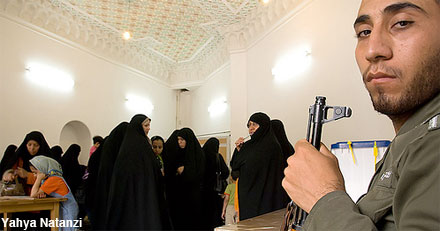
The new US Ambassador to the United Nations, Dr. Susan Rice, has vowed that the Obama administration intends to pursue “vigorous diplomacy” to prevent the Islamic Republic from obtaining nuclear weapons.
According to Obama himself, such diplomatic overtures will be complemented by a principled “carrots and sticks” approach conducted, presumably, in concert with the EU and — potentially — China and Russia, who have traditionally been less willing to really press Tehran to comply with its NPT obligations. Clearly then, the Obama administration needs to immediately to reach out to these powers, as well as the broader international community, to make the case that a nuclear-armed Islamic Republic is simply an unacceptable prospect.
One wonders however, if reaching out directly to the Iranian people is part of Obama, et al’s diplomatic agenda? While many courageous Iranians have openly questioned the regime’s confrontational stance when it comes to Iran’s nuclear dossier, opinion polling has shown that, by and large, the majority of the Iranian people strongly believe that the their nation has an inherent right to nuclear technology and even nuclear weapons. Of course, any polling data coming out of a totalitarian society should be taken with more than a grain of salt.
That said, it’s safe to assume that the nuclear issue has become a matter of patriotic pride for the Iranian people — to the point that even some opponents of the regime have expressed support for its efforts in the nuclear arena. The nuclear issue, in other words, has come to transcend bitter disagreements with the regime on many other fronts, including democratization, secularization, women’s rights, economic reform, etc.
Given that this is the case, should the US and its allies deliver a message to the Iranian people (as separate from the clerical regime)? If so, what would such a message consist of?
I would argue that the US, European Union, and other responsible powers should indeed speak with the Iranian people, in addition to whatever other incentives and disincentives they’d provide to the regime to persuade it to abandon its dangerous course of action. Such a “dual communication” strategy is nothing new: the free world’s history is indeed replete with examples of leaders who warmly reached out to the peoples of enemy governments, most especially Ronald Reagan.
Obama himself has already began to follow such a path by distinguishing governments who rule by ”silencing dissent” from the peoples they oppress. But Obama needs to go much further in the coming years. Moreover, he needs to explicitly address the nuclear issue when doing so.
So how should the US voice its opposition to the Islamic Republic’s nuclear endeavors in a way that appeals to the “hearts and minds” of the Iranian people? The simplest, most effective message to the Iranian people would be to say that the US, fully and without reservation, supports the Iranian people’s right to acquire nuclear technology, but then add: since the IRI is not a legitimate representative of the Iranian people, to oppose its nuclear programs is not tantamount to violating the sovereign rights of the Iranian nation. The US should further reason that, if anything, a nuclearized IRI represents a threat to the interest of all Iranians who are not happy with the status quo in their country, including those seek to only change the regime’s behavior if not the regime itself. After all, it will be much more difficult to modify the regime’s behavior at home and abroad — let alone change the regime altogether — once the IRI is able to boast a nuclear arsenal.
I believe such a line of reasoning and such a message will do much to reduce domestic support for the regime’s nuclear policy. Let’s hope Obama will use his immense powers of rhetoric to deliver such a message.






